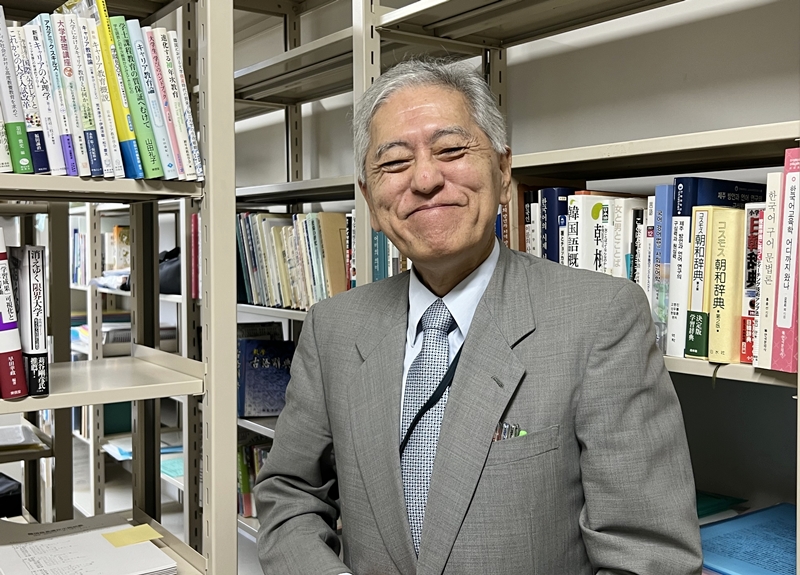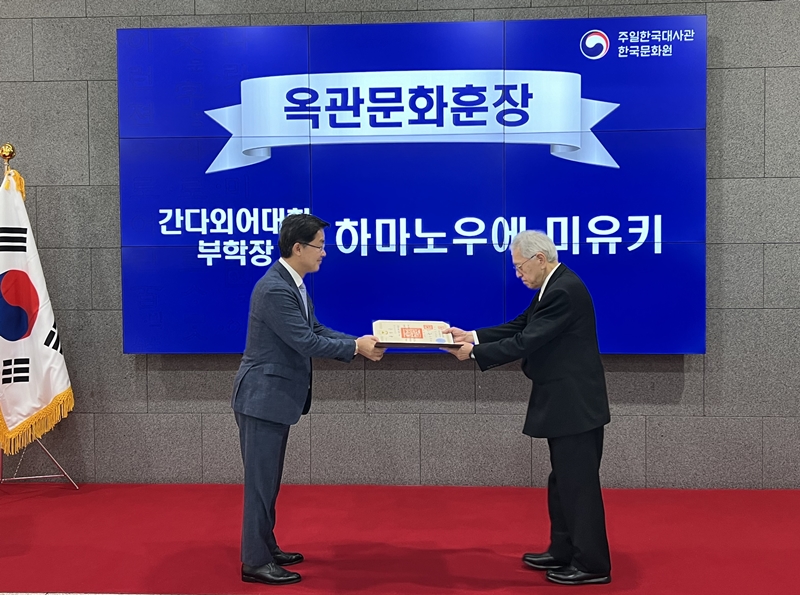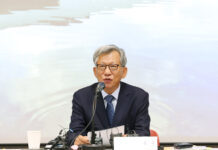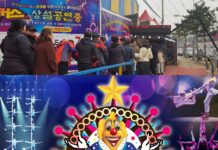
Miyuki Hamanoue, a professor of Korean at Kanda University of International Studies in Chiba, Japan, on Oct. 28 smiles during an interview with Korea.net at his office. “Korean is really interesting because of the different language based on age, gender and social class as well as numerous social dialects. I’m a teacher of Korean but still learning it.”
By Lee Kyoung Mi and Honorary Reporter Kaori Yoshioka
Photos = Kaori Yoshioka
“What do you need when learning Korean? Genuine respect for Korea and the attitude of respecting the language as a foreign tongue. Those who keep using unnatural expressions thinking that it’s fine to communicate cannot understand the rich world of Korean. That would be a big loss.”
Miyuki Hamanoue, vice dean at Kanda University of International Studies (KUIS) in Chiba, Japan, on Oct. 9 received the Okgwan Order of Cultural Merit at a ceremony to mark Hangeul Day. The award goes to contributors to the development of Korean culture and arts.
A professor of Korean at the school’s Department of Asian Languages, he was recognized for his contributions to the development of the Korean alphabet Hangeul.
Attending the Oct. 31 awards ceremony at the Korean Cultural Center in Tokyo, he lauded his students by saying, “I received this medal on behalf of about 1,000 Korean majors graduates of KUIS.”
Always smiling when speaking about Korea and its language, the scholar on Oct. 28 gave Korea.net’s Honorary Reporter Kaori Yoshioka an interview three days before his reception of the award, at his school office in Chiba.
Miyuki Hamanoue (right), vice dean at Kanda University of International Studies in Chiba, Japan, on Oct. 31 receives the Okgwan Order of Cultural Merit at the Korean Cultural Center in Tokyo. He was recognized for helping spread Korean in Japan by writing textbooks and research papers for learners of the language; contributing to friendly relations between Korea and Japan, and achieving academic results through 30 years of research on the modern grammar Korean system.
How is Korean’s status as a language in Japan?
In numbers, I know that the competition for admission to the Korean-language department at KUIS is overwhelmingly higher than in other departments, and the same applies to other private universities as well. Korean is the most popular choice for a secondary foreign language among college students, but Japan has a severe lack of Korean-language teachers.
In quality, Korean is clearly different from other languages. Languages are classified as academic and commercial, but I want to categorize Korean as “cultural.” I think many want to learn Korean not for advanced academics or money earning, but to enjoy Korea’s cultural aspects (pop music, movies, drama, food, beauty, fashion and literature).
Do you have a rule you always follow when teaching Korean?
It’s not a teaching method, but I always teach based on the thought that students form perceptions about the language through the teacher that teaches it. In other words, a teacher shouldn’t be too old-fashioned but cool. For this, I believe that teachers should 1) pay attention to their attire; 2) use polite speech; 3) have the latest educational equipment; and 4) contain topics of high academic quality.
This is my own rule, and I’ve never thought of imposing it on other teachers of Korean.
– What is your favorite Korean word or expression?
For some reason, I’m drawn to purely Korean words that end in vowels like mujigae (rainbow), sonagi (rain shower) and maeari (echo). And sarcasm is both very Korean and fun. For instance, I’m fascinated by how Koreans say “How would I know?” instead of “I don’t know.”
– What tip do you have for learners of Korean?
The worst thing is to force yourself to study Korean for a specific purpose or idea. It doesn’t matter how you access the language given the many ways to approach it. Start with your favorite reasons. It’s also OK to have various ways to access Korean.
(In interviews for admission to the Korean-language department), many students say they want to play a bridge role between Korea and Japan because of fear of rejection, but you don’t have to say that. Just be honest and say you began studying Korean due to your favorite things.
km137426@korea.kr























